-
Science & SteepleflowerPoemsFrom"Field Guide to Southern Virginia"
Egrets picketing the spines of cattle in fields edged
with common tansy. Flowers my father gathered
for my mother to chew. To induce abortion. A common,
cosmopolitan agnostoid lithofacies naked in the foothills. I love
the character of your intelligence, its cast as well as pitch.
Border wide without marginal spines. At high angles
to the inferred shoreline.
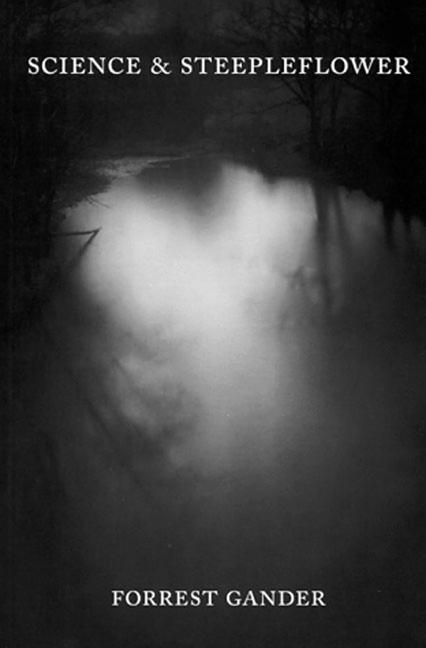 Science & Steepleflower : Poems
Science & Steepleflower : Poems -
Science & SteepleflowerPoemsFrom"Anniversary"
Not to be known (to be known always) always by my wounds,
I buried melancholy’s larvae
And turned toward you.
I gathered myself
Like the dusk
To the black tulips of your nipples. (Tulips, tulips).
For seven days we locked the door,
We scoured the room with bird’s blood.
And for a little while
In the hollow where your throat rose
From between your splendid clavicles, (rose, rose)
Our only rival was music,
The piano of bone-whiteness.
Nor did the light subside,
But deepeningly contracted.
The rawness of the looking.
The quiver.
 Science & Steepleflower : Poems
Science & Steepleflower : Poems -
Science & SteepleflowerPoemsFrom"Eggplants and Lotus Root (Meditative)"
A dog manages to catch its own tail. At first
the traveler laughs, but then shouts and weeps.
No news will ever be obtained regarding that
about to be lost.
Rain for forty days. Surrounded by mountains.
When it brims, the water has raised him to the
peak.
The responses to death are sometime funny.
A man opens his wrist without drawing blood;
a woman opens a book with nothing inside.
 Science & Steepleflower : Poems
Science & Steepleflower : Poems
-
The Boys of My YouthA MemoirFrom"Bonanza"
I went to visit Grandma and Ralph for a week right after having learned how to whistle. I whistled at all times, with dedication and complete concentration. When I was asked a question I whistled the answer, I whistled along with people as they talked, I whistled the answer while I worked, I whistled while I played. Eventually they made a rule that whistling was forbidden in their house.
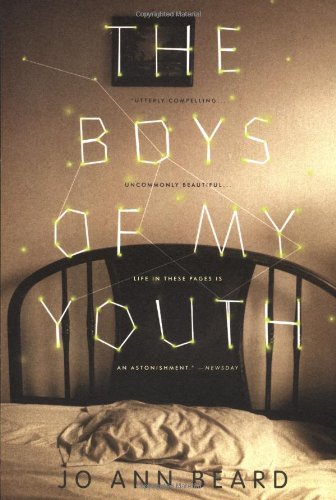 The Boys of My Youth : A Memoir
The Boys of My Youth : A Memoir -
The Boys of My YouthA MemoirFrom"Coyotes"
You have to be going really fast for this trick, over seventy miles an hour. Both of us recline our seats all the way down, I do the gas pedal with my left foot and hold the steering wheel steady with my left hand while Eric climbs into the back seat. I move over the gear shift and slide into his seat while he climbs over my reclined seat back into the passenger side. It’s not exactly that smooth, of course, there is a lot of swerving and hollering that goes along with it. We settle in and bring our seat backs into position and open a can of malt liquor.
 The Boys of My Youth : A Memoir
The Boys of My Youth : A Memoir -
The Boys of My YouthA MemoirFrom"Bulldozing the Baby"
Hal’s body has become lumpy, with protrusions of wadded stuffing in some spots and absolutely nothing in others. My mother tries to fix him each morning by squeezing him like a tube of toothpaste, forcing the stuffing from his lower body into his upper body. A gritty, sandlike substance is coming through his pores. He’s still smiling. Hal and I are the only ones who don’t care about personal appearances.
“She tried to give him a bath,” my mother tells my aunt, who is holding Hal and looking at him through the bottoms of her bifocals. They’re trying to figure out if he can be given a torso transplant. My aunt runs her thumb over his bald spot.
“The paint’s wearing off his head,” she says definitively. “Throw him out and get her a new one.” Thus spake Bernice.
 The Boys of My Youth : A Memoir
The Boys of My Youth : A Memoir
Selected Works
read more >-
MississippiAn American Journey
One night during this time my mother started asking me questions, out of the blue, about William Faulkner. She was taking a night-school course and wanted to write about the Nobel laureate from her hometown, New Albany. Why Faulkner, I asked, of all the writers in the world to care about? Why not Richard Wright, James Baldwin or Zora Neale Hurston? “We’re kin to some Faulkners,” she said. I laughed out loud and informed her that this Faulkner was white. My mother smiled and said, “So?”
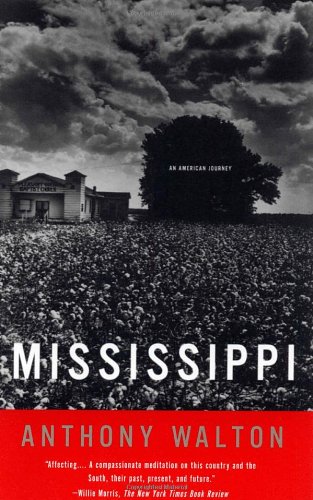 Mississippi : An American Journey
Mississippi : An American Journey -
MississippiAn American Journey
As I write in 1993, the mayor of Vicksburg is a black man. Contemporary Vicksburg is a sleepy river city with a predominantly black population, and race relations are quiet: the residents, black and white, seem to go about their business with a certain peacefulness, even equanimity, that belies the city’s history. But though it sits so pretty on the bluffs, it has an atmosphere equally seedy, empty and tired on a quiet summer afternoon. I drove down fabled Catfish Row, a strip of black food shops and juke joints one afternoon, and found it deserted, few pedestrians and no cars. This was true of most of the other streets in Vicksburg, including U.S. 80, the east-west thoroughfare. Most of the city’s automobile traffic was on Interstate 20, which crosses the Mississippi on a cantilevered bridge, the twin of the structure at Natchez, and barrels on past the dingy brick buildings and frame houses of Vicksburg for Jackson.
 Mississippi : An American Journey
Mississippi : An American Journey -
MississippiAn American Journey
Mississippi blues are simple, built on modal one-, two- and three-chord harmonies, rhythmically intense and searingly emotional. Many see the blues as boozy, folk-existential wails, but as musician Vernon Reid notes, the blues are inevitably sociological. The style arose in part as a reflection of social unrest: the blues are the cries of souls under lock and key, a way of speaking when doomed to silence, a parallel language of human expressiveness. They are a way of analyzing, understanding and notating past experience and then distancing oneself from it with irony and humor that contain but do not deny the trauma. Bluesmen bewail “evil women,” but such complaints are not a joke, as often relationships with women were the only wealth those men had; and muttering in a song about leaving for Chicago might have been their only means of criticizing the plantation boss.
 Mississippi : An American Journey
Mississippi : An American Journey
Selected Works
read more >-
Holy LandA Suburban Memoir
You leave the space between the houses uncrossed. You rarely go across the street, which is forty feet wide.
You are grateful for the distance. It is as if each house on your block stood on its own enchanted island, fifty feet wide by one hundred feet long.
People come and go from it, your parents mostly and your friends. Your parents arrive like pilgrims.
But the island is remote. You occasionally hear the sounds of anger. You almost never hear the sounds of love.
You hear, always at night, the shifting of the uprights, the sagging of ceiling joists, and the unpredictable ticking of the gas heater.
 Holy Land : A Suburban Memoir
Holy Land : A Suburban Memoir -
Holy LandA Suburban Memoir
A woman calls repeatedly about her Christmas tree.
The city’s trash hauler picks up the discarded trees. If a tree is taller than four feet, it must be cut in half before the trash hauler will pick it up.
The woman’s tree is over four feet. The woman has no one to saw her tree in two.
She is advised, gently, to ask a neighbor. But she won’t.
She says she no longer knows her neighbors well enough.
 Holy Land : A Suburban Memoir
Holy Land : A Suburban Memoir -
Holy LandA Suburban Memoir
It is unlawful to tell the future in my city. One of the oldest ordinances in the city code book, adopted when the city incorporated in 1954, lists the illegal practices by which the future may not be foretold.
It is illegal to furnish any information “not otherwise obtainable by the ordinary processes of knowledge by means of any occult psychic power, faculty or force, clairvoyance, clairaudience, cartomancy, psychology, psychometry, phrenology, spirits, seership, prophecy, augury, astrology, palmistry, necromancy, mind-reading, telepathy, or by any other craft, art, science, talisman, charm, potion, magnetism, magnetized substance, gypsy cunning or foresight, crystal gazing, or oriental mysteries.
 Holy Land : A Suburban Memoir
Holy Land : A Suburban Memoir
Selected Works
read more >-
Make Me WorkStoriesFrom"A Half Hour with God’s Heroes"
The statue’s resting place looked pretty good. All she really had to do was get him deep enough so the dogs didn’t dig him up before the sale. After her exertions over his tomb, the hollow Saint Joseph seemed to weigh nothing in her hand. He seemed to float in space before her eyes. She set him down on his back in the hole, but found that she couldn’t shovel the dirt on top of him, not right on his face like that. She turned him face-down, but that seemed worse. When she picked him up again, half-frozen dirt had sifted into his open base. You could see it through the translucent, cream-colored skin: Saint Joseph turning brown as he filled up with soil.
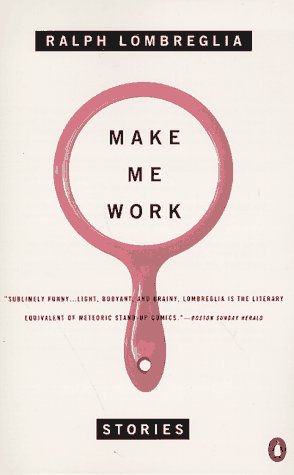 Make Me Work : Stories
Make Me Work : Stories- Print Books
- Find your local bookstore (via IndieBound)
- Powell's
- Barnes & Noble
- Alibris
- Abe Books
- E-Books
- Kobo
- Barnes & Noble
-
Make Me WorkStoriesFrom"Every Good Boy Deserves Favor"
Jennifer was a performance artist. The blood was a prop in her act. There were many props in Jennifer’s act, but blood was the unifying device. She concealed plastic sacs of the homemade blood in various articles she had with her onstage—a child’s fluffy teddy bear, her pearl-encrusted evening bag, the bodice of her white bridal gown. For an hour she paraded about to her own synthesizer music, acting out dysfunctional family relationships and decrying bankrupt, oppressive governments, while the Barbie-doll world hemorrhaged around her.
 Make Me Work : Stories
Make Me Work : Stories- Print Books
- Find your local bookstore (via IndieBound)
- Powell's
- Barnes & Noble
- Alibris
- Abe Books
- E-Books
- Kobo
- Barnes & Noble
-
Make Me WorkStoriesFrom"Heavy Lifting"
More than anything, he would like to turn the nighttime sky into 3-D color TV. That would be the most incredible hack of all, he says, and he claims to know how to do it, but it would cost a lot of money, even for a few seconds, and so far the funding has been elusive. He pitched the idea to his old friend Vernon DeCloud—financing celestial television by selling some sky-time for advertising—and though Vern would be perfectly happy to go down in history as the man who turned the stratosphere into a Coke commercial, he said no. Vern didn’t believe Tempesto could do it.
 Make Me Work : Stories
Make Me Work : Stories- Print Books
- Find your local bookstore (via IndieBound)
- Powell's
- Barnes & Noble
- Alibris
- Abe Books
- E-Books
- Kobo
- Barnes & Noble
Selected Works
read more >-
The EntertainerMovies, Magic, and My Father's Twentieth Century
“Then in the second half of the show,” my father recalled, “MacKnight would hypnotize subjects who came up from the audience, and he’d get them to do all kinds of things, and some of them I think he really did hypnotize but others would sort of fake it. He had people who traveled along with him, and I was one of them. I was supposed to sit in the audience and then come up onstage. And the audience must have known very well that I was a phony, because I had just done my magic act in the first part of the evening! But then I went out and sat in the audience, and he said, Will any volunteers come up, and up I would jump along with someone else. Of course, I was supposed to be hypnotized, but I never was. I wanted to be. I thought, Gee, I mustn’t fake this, because it was supposed to be for real, but he could never get me to be really hypnotized, so I always did have to fake it.”
 The Entertainer : Movies, Magic, and My Father's Twentieth Century
The Entertainer : Movies, Magic, and My Father's Twentieth Century -
The EntertainerMovies, Magic, and My Father's Twentieth Century
Warner Brothers, the pioneering studio when it came to sound, had started producing short movies using a system called Vitaphone, in which records were made to accompany the films, then played on phonographs hooked up to movie projectors in the theaters. There were plenty of skeptics, including the father of motion pictures himself, Thomas Edison: “No, I don’t think the talking moving picture will ever be successful in the United States,” he declared in 1927. “Americans prefer silent drama. They are accustomed to the moving picture as it is and they will never get enthusiastic over any voices being mingled in. Yes, there will be a novelty to it for a little while, but the glitter will soon wear off and the movie fans will cry for silence or a little orchestra music.”
 The Entertainer : Movies, Magic, and My Father's Twentieth Century
The Entertainer : Movies, Magic, and My Father's Twentieth Century -
The EntertainerMovies, Magic, and My Father's Twentieth Century
Lyle’s own life after the war had begun to seem like something out of one of the B noirs—a stumble down a long, dark alley. He was drinking a lot. His favored drinking companion was a man named Philip Van Zandt, a mustachioed Dutch-born character actor who was often cast as a Nazi, though he also turned up in Citizen Kane and a clutch of Three Stooges shorts. Van Zandt had a compulsion for gambling and a tendency to depression, but like Lyle, he loved to work, and he, too, managed to pull himself together when he had an acting job. Lyle was not a depressive. But he was vulnerable, on occasion, to a certain vaporous despair. In my experience—I saw it a few times later—this fleeting melancholy did not express itself as a disappointment with himself or his life, professional or personal, though perhaps that was the well-hidden trigger. It was more like an existential sadness: about mortality, the state of the world, human limits. He treated that feeling successfully by working—hence the willingness, the eagerness, to take any role that came along.
 The Entertainer : Movies, Magic, and My Father's Twentieth Century
The Entertainer : Movies, Magic, and My Father's Twentieth Century
Selected Works
read more >-
The Age of Wire and StringStoriesFrom"Sleep (Intercourse with Resuscitated Wife)"
Intercourse with resuscitated wife for particular number of days, superstitious act designed to insure safe operation of household machinery. Electricity mourns the absence of the energy form (wife) within the household’s walls by stalling its flow to the outlets. As such, an improvised friction needs to take the place of electricity, to goad the natural currents back to their proper levels. This is achieved with the dead wife. She must be found, revived, and then penetrated until heat fills the room, until the toaster is shooting bread onto the floor, until she is smiling beneath you with black teeth and grabbing your bottom. Then the vacuum rides by and no one is pushing it, it is on full steam. Days flip past in chunks of fake light, and the intercourse is placed in the back of the mind. But it is always there, that moving into a static-ridden corpse that once spoke familiar messages in the morning when the sun was new.
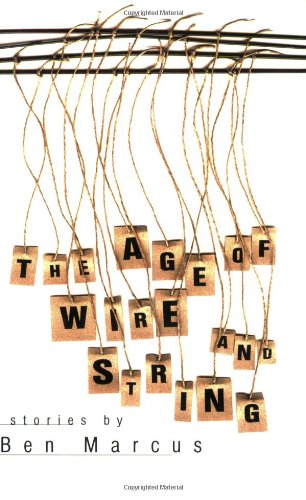 The Age of Wire and String : Stories
The Age of Wire and String : Stories -
The Age of Wire and StringStoriesFrom"Food (Hidden Food, from Above)"
The chief legal problem connected with hidden food is that of title. A scavenger cannot acquire title to chicken that he has discovered abruptly, and therefore he cannot transfer title even by barter to an innocent dining man who has requested a stew. Hence the rightful owner of the chicken may take it without compensation from anyone who has not properly tracked it according to the rules set forth in the Topographical Legend and Location of Food Nooks. The innocent dining man, however, may challenge the scavenger for breach of his implied warranty of good title as it applies to edible objects, in this case the promised delivery of a chicken bisque with definite ownership.
 The Age of Wire and String : Stories
The Age of Wire and String : Stories -
The Age of Wire and StringStoriesFrom"The House (Works from the War Between Houses and Wind: Air Dies Elsewhere)"
When air kills itself in remote regions, the debris settles here on the grass, sharpening the points. Men of the house may not walk on these areas, nor may they ever observe the grass without pain in the chest and belly. They exist as figures which are doubled over, in static repose against the house territory. When children sleep on these points of lawn, the funeral of air passes just above their heads in a crosswind with the body. Funerals generally are staged in pollinated wind frames, so that the air can shoot to the east off of the children’s breath, dying elsewhere along the way, allowing fresh, living air to swoop in on the blast-back to attack the house.
 The Age of Wire and String : Stories
The Age of Wire and String : Stories
Selected Works
read more >-
The Red HourglassLives of the PredatorsFrom"Black Widow"
I decided the caterpillar was too stupid to live. I put it into the carabid beetle’s container. The caterpillar was much larger, but it had no means of defense. The carabid sliced into it and lapped at its leaking blood. Because the caterpillar was so big, the carabid had to repeat his attack eight or ten times. The caterpillar crawled away frantically for the first few wounds, but it was so slow that its movements hardly inconvenienced the beetle drinking from its bleeding flank. After ten minutes or so the caterpillar lay still. Its jade flesh turned black as the beetle chewed and drained it.
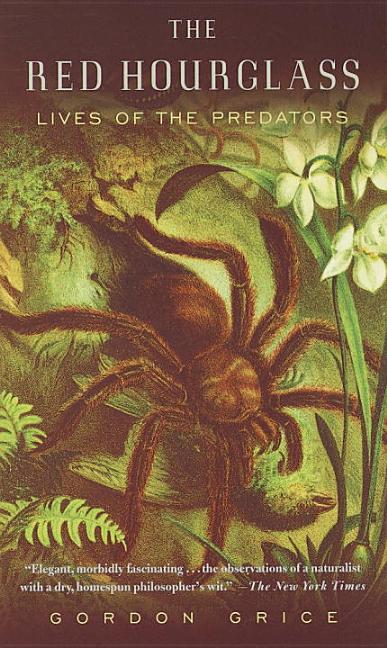 The Red Hourglass : Lives of the Predators
The Red Hourglass : Lives of the Predators -
The Red HourglassLives of the PredatorsFrom"Mantid"
The copulation continues. It lacks the aerobics of a mammalian encounter. After the insertion it involves, besides the cannibalism, merely clinging and a slight pulsing in the male’s soft abdomen. It may go on for a long time; some couplings have outlasted my patience for watching. The genitals fit so tightly that, if you try to separate the pair, their bodies will tear apart before they disengage.
 The Red Hourglass : Lives of the Predators
The Red Hourglass : Lives of the Predators -
The Red HourglassLives of the PredatorsFrom"Rattlesnake"
A prairie dog guard sees a rattlesnake coming and chirps the alarm. The adult prairie dogs defend their burrows, throwing their tails up to appear menacing and making bluff charges at the snake. They work in teams, one distracting while another rushes in for a bite. The rodents have formidable teeth and can kill a rattlesnake, though they rarely manage to. Some people say prairie dogs will seal a rattlesnake in their own burrow once he’s inside, entombing him alive, Poe-style.
 The Red Hourglass : Lives of the Predators
The Red Hourglass : Lives of the Predators
Selected Works
read more >-
The IntuitionistA Novel
“You aren’t one of those voodoo inspectors, are you? Don’t need to see anything, you just feel it, right? I heard Jimmy make jokes about you witch doctors.”
She says, “Intuitionist.” Lila Mae rubs the ballpoint of the pen to get the ink flowing. The W of her initials belongs to a ghost alphabet.
The super grins. “If that’s the game you want to play,” he says, “I guess you got me on the ropes.” There are three twenty-dollar bills in his oily palm. He leans over to Lila Mae and places the money in her breast pocket. Pats it down. “I haven’t ever seen a woman elevator inspector before, let alone a colored one, but I guess they teach you all the same tricks.”
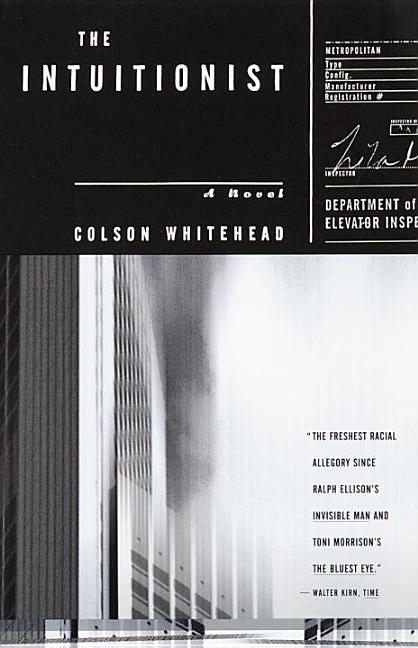 The Intuitionist : A Novel
The Intuitionist : A Novel -
The IntuitionistA Novel
She learned plenty her first semester at the Institute for Vertical Transport. She learned about the animals in the Roman coliseums hoisted to their cheering deaths on rope-tackle elevators powered by slaves, learned about Villayer’s “flying chair,” a simple pulley, shift and lead counterweight concoction described in a love letter from Napoleon I to his wife, the Archduchess Marie Louise. About steam, and the first steam elevators. She read about Elisha Graves Otis, the cities he enabled through his glorious invention, and the holy war between the newly deputized elevator inspectors and the elevator companies’ maintenance contractors. The rise of safety regulation, safety device innovations, the search for a national standard. She was learning about Empiricism but didn’t know it yet.
 The Intuitionist : A Novel
The Intuitionist : A Novel -
The IntuitionistA Novel
The man enters the car on the first floor and declares, “Department of Elevator Inspectors.” He flips open the badge, that gold nova, to the agitated wives, who suddenly see their afternoon assignation get complicated. “Everybody out.” He is authority… Look at that gray fedora slashing across his brow, brim bent downward to hide his eyes, casting shadows just where shadows need to be, the sophisticated craftsmanship of his solemn pinstripe suit, cut in a Continental, the skin of his authority. Look at that. He is an elevator inspector down from the capitol to kick their hamlet into shape, taking charge, checking for rust.
 The Intuitionist : A Novel
The Intuitionist : A Novel